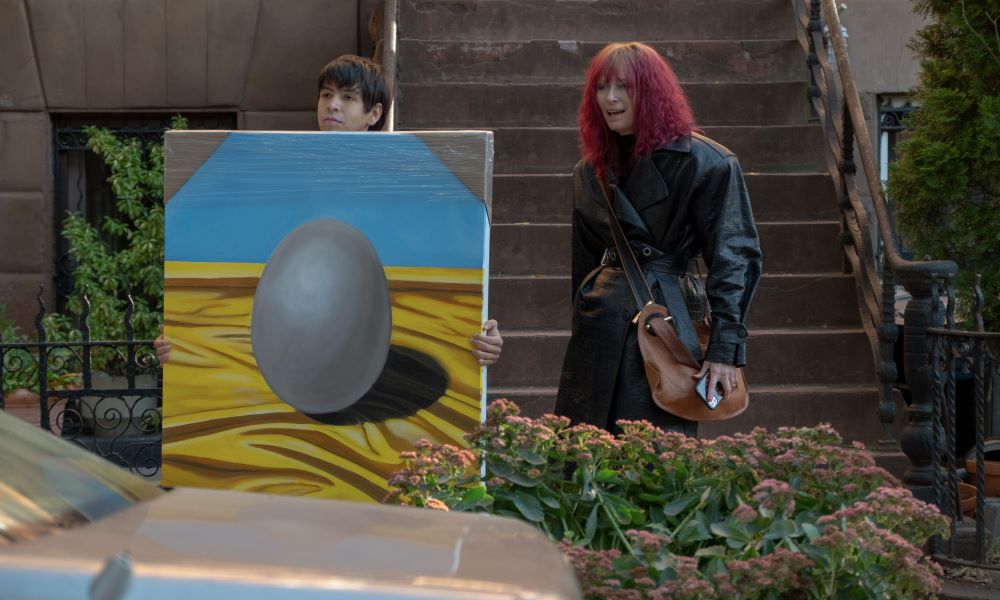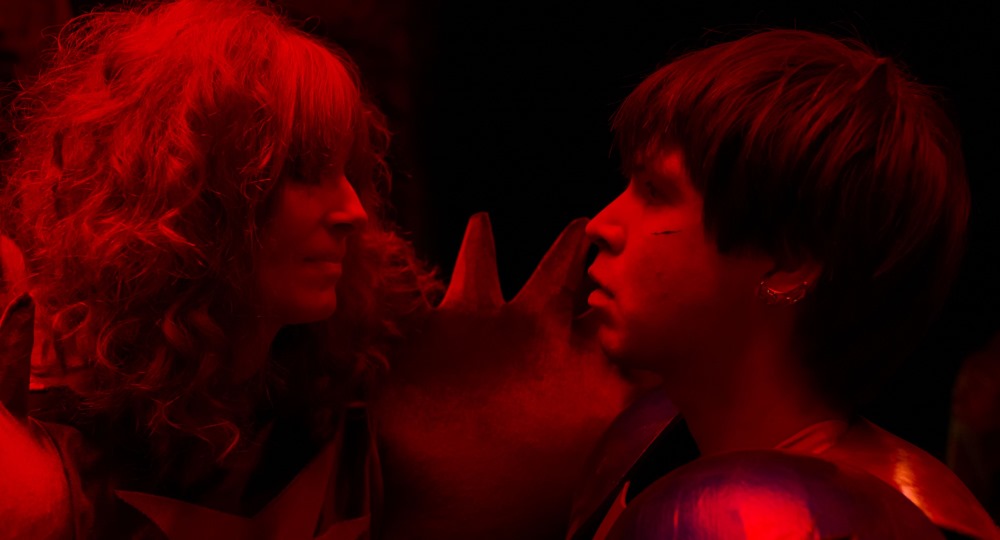Accents and Cowlicks: Julio Torres on Problemista
SNL alum explores the magical world of immigration
By Richard Whittaker, 8:28PM, Thu. Mar. 21, 2024

It’s true to say that Julio Torres sparkles.
At the beginning of a long day of press and a screening of his debut feature as star, writer, and director, the magical realist comedy Problemista, the Emmy-nominated Saturday Night Live writer and star and co-showrunner of HBO’s Los Espookys has a little glitter going on. Sitting in the suitably disco-themed Truly Outrageous karaoke room at the Highball, Torres looks dressed for the location, with a threaded blue leather jacket and impeccable early morning makeup.
It’s a look infinitely removed from that of Alejandro, Torres’ character in Problemista: An aspiring toy designer, he seems to shun being noticed. At the same time, there’s a huge amount of Torres in Alejandro. Both are Salvadorean-born migrants to America. Both are hugely influenced by their creative mothers, both of whom are architects. And both have this little cowlick of hair that *poinks* out to the side unless restrained. However, Torres keeps it under control, while the timid Alejandro just lets it have its own way. “It’s something that my hair does sometimes, and something that my father’s hair does a lot,” Torres explained. “I saw it and went, ‘Oh, we should keep this. We should make sure it’s always there. Because it tells you a lot very quickly.’”

There’s a similar minute decision that informs the character of Elizabeth, played by Tilda Swinton. When Alejandro’s visa is about to be canceled, he starts assisting the unruly and raucous art collector as she tries to arrange a retrospective show for her late and now cryogenically frozen painter husband (played by RZA). She may seem like a born-and-bred New Yorker, rattling off complaints at a million words a minute, but she’s just as much an outsider as Alejandro.
Moreover, not simply is she British, but her accent is weighed down by the distinctive long vowels of the West Country – and working-class West Country, to boot. That all came from the actress: Torres explained the part was originally written as American “but then Tilda found that accent and it really made us laugh.” However, that choice did a lot more than simply make Elizabeth sound funny: In her pronunciation is a whole history of outsiderdom. “Imagine her being out of place everywhere,” Torres said. “She’s out of place in London, and somehow ending up here. This is not a snooty, well-to-do, well-adjusted, enviable life. This is like a wild animal, clawing her way through life.”
When Elizabeth hurts Alejandro, it’s not with malice but with blithe ignorance or self-involvement. Indeed, there’s no simple villain here, especially when it comes to Alejandro’s struggles to stay in America and work towards his dream job. To do so, Torres said, “would be disingenuous.” Instead, the peril is from a faceless institution: the American immigration system. He provides American audience with an insight into a bureaucracy that seems sensible from the outside but is almost impossible to navigate. “The word ‘broken’ is used over and over again in the media,” Torres said. “It’s so clunky and haphazardly put together, but it doesn’t have the humility of a system that’s clunky and haphazardly put together. Instead, it has the ego of an all-knowing, all-powerful entity. So it’s the worst of both worlds.”
The threat to Julio’s immigration status permeates the whole story, and again that’s taken from Torres’ own experiences. Like everyone who has been through the immigration process, Torres said, “My life at that time was so informed, if not monopolized, by that.” He contrasted navigating its baroque intricacies with “checking into a shitty hotel. Maybe things don’t work, but at least the person there laughs about it, or maybe you get to commiserate about it. This, you get five-star snootiness with zero-star efficiency.”
However, he never intended to make a polemic about the state of the immigration system. “It’s not like I was like, ‘What do I make a movie about?’ and then ‘Oh, immigration feels like an interesting decision.’ It’s not so much me choosing that as a topic as me choosing that part of my life as a topic. So, it goes into it from a personal point of view rather than a broader political one.”
The film is also about creativity: as Torres noted, Alejandro’s oddball toy designs “are no greater or lesser” than the paintings that Elizabeth protects so strenuously. Again, he's influenced by his mother. Yes, she is an architect, but also a furniture designer, and creates clothing. So Torres isn’t moving into filmmaking any more than he moved from standup to TV. Instead, he described himself as becoming more of a "world-building ideas sort of person, where I'm experimenting with mediums."

He's also experimenting with influences. In the film, the complexities and seeming arbitrariness of the immigration process are given life through surrealist imagery: a room full of hourglasses, interlocking offices that make no geometrical sense, people suddenly vanishing. Unsurprisingly for a film about fine art, fine art is a deep and abiding force within the story. There’s a magical realist element, and Torres was especially drawn to German Expressionism with its “dark, mazelike landscapes.” Moreover, for Swinton’s character he and costume designer Catherine George were captivated by the works of British surrealist Mary Leonora Carrington. There is, he noted, a painting by Carrington called “The Giantess (The Guardian of the Egg),“ a title echoed in the film through Elizabeth's obsession with protecting the legacy of her husband’s egg-themed artwork. Moreover, it would not be hard to see Swinton as one of her subjects, braced as she often is being wild and restrained. Looking at Carrington’s works, Torres said, “So much of them look like Tilda in the movie.”
Torres contrasted the surrealist influences on Problemista with an earlier Swinton film: Dr. Strange. In that Marvel blockbuster, "there's a real world and a heightened, magical world." In his film, the two merge and flow into each other, and Torres credited production designer Katie Byron for weaving those elements together. “She really understood how to split the difference between the fantastical set pieces and the utterly mundane.” In those set pieces, he explained, “there’s a craftiness to them that feels handmade. There’s a sheen to them that is as lovely and pathetic as the real world is.” Then there’s what he calls “the trash still lives … heightening the real world a little more, and just seeing all the shitty little parts of the world with a lot of love.”
The result is what he called "a murky in-between," an ambiguous state that can be reminiscent of both waiting for a visa and getting a film released visa. It’s been a year since Problemista debuted at 2023’s South by Southwest Film & TV Festival, but that doesn’t mean the project has been sat on the shelf for 12 months, waiting for a release date. Torres noted, “It must be very disorienting for an actor who does something and then lets it go and then it comes back, but it feels like I haven’t stopped doing it … It’s just a different stage of it because I’m so at the heart of all of that.”
However, after all that time his relationship to the film has inevitably changed. “Maybe I feel a little less precious about it,” he said. Now, with the release imminent, “I feel tired, but not daunted.”
Problemista is in theatres now. Find our review and showtimes here.
A note to readers: Bold and uncensored, The Austin Chronicle has been Austin’s independent news source for over 40 years, expressing the community’s political and environmental concerns and supporting its active cultural scene. Now more than ever, we need your support to continue supplying Austin with independent, free press. If real news is important to you, please consider making a donation of $5, $10 or whatever you can afford, to help keep our journalism on stands.
July 12, 2024
July 12, 2024
Problemista, Julio Torres, Tilda Swinton, A24








